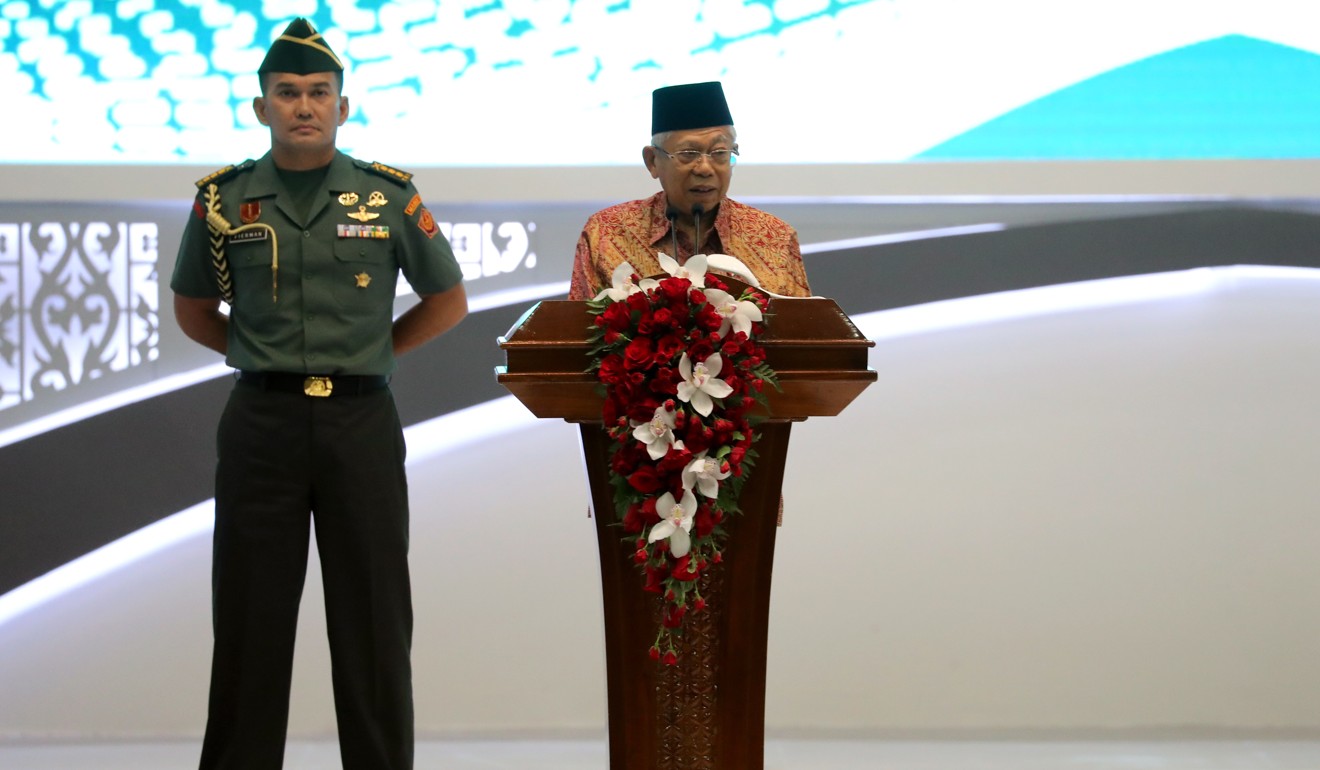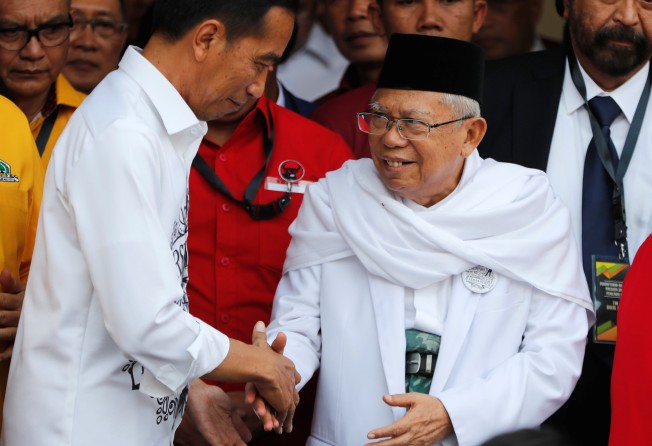
Indonesia’s Ma’ruf Amin to fight radicalisation that has spread from ‘play groups to government’
- The vice-president and senior cleric is seen as a figure who has the Islamic credentials to take on the country’s hardliners
- Religious radicalisation has spread from schools to the civil service, state-owned enterprises, police and military

Indonesian Vice-President Ma’ruf Amin, 76, has been appointed by President Joko Widodo to lead the government’s campaign against the spread of radical ideologies, which the senior cleric said had “reached unimaginable places from preschool play groups to government institutions”.
“The challenge is getting bigger because radicalism has a growing influence on society, not just among civil servants but also students. We even received reports that it has already found its way to the PAUD [preschool play groups],” Ma’ruf said in a recent interview with BeritaSatu TV.

Indonesia is grappling with a rise in radicalism along with the threat of terrorism, with recent attacks carried out by the country’s largest Isis affiliate, Jamaah Ansharut Daulah (JAD).
Efforts to stem the rising tide of extremist ideology have taken on an added urgency following the discovery that two policewomen and one worker at state-owned PT Krakatau Steel were among dozens of terror suspects arrested in recent months.
Religious radicalism has spread to “many fields” including the civil service, state-owned enterprises, police and military, said Parliamentarian Yaqut Cholil Qoumas from the Nation Awakening Party (PKB), the political party of Nahdlatul Ulama (NU), the country’s largest Muslim organisation.
“The wrong understanding of religion leads people to use religion as a norm to make enemies out of people who are different from them. They regard this country as the devil, an infidel and not ruled in accordance with sharia law,” said Yaqut.
Indonesia has a secular constitution despite being the world’s most populous Muslim nation, with more than 90 per cent of its 260 million people being Muslims.
“The spread of this [radicalism] is carried out by people who are obsessed with an Islamic caliphate in Indonesia,” Yaqut said.
The spread of radical teachings began around 15 years ago when groups such as Hizbut Tahrir Indonesia (HTI), Muslim Brotherhood, Wahabbis and Salafis entered the country, said Benny Mamoto, head of research for Police Study and Terrorism at the University of Indonesia.
HTI, which campaigns for a caliphate through non-violent means, was banned by the government in 2017.
“They [radical groups] entered into all layers of society including education. During the entire 10-year administration of the previous government, former president Susilo Bambang Yudhoyono did not take any preventive steps or pressure these groups and so they grew big,” said Mamoto.
Mamoto is a former police general who investigated some of the country’s biggest terror attacks, including the 2002 Bali bombings, which killed 202 people, including 11 Hong Kong residents.
Left unchecked, the radical teachings penetrated preschools, primary, secondary and high schools.
“Many lecturers and teachers are exposed to radicalism to the point where they recruit university students as well as their parents,” said Mamoto.
Many graduates of those schools are now working in the civil service, military and police force “where they recruit their juniors as well as their families”, said Mamoto.
“An example of the impact of radicalisation within the civil service is how some civil servants promoted their ideology by infiltrating religious studies with books that teach about the caliphate,” said Mamoto.
Two weeks ago, the Religious Affairs Ministry announced plans to replace 167 Islamic textbooks deemed to contain extremist or intolerant material in schools by the end of the year.
Ma’ruf said the Bureaucratic Reform Ministry will get involved in filtering out state employees with radical views.
“We will handle this issue comprehensively from the upstream to the downstream. We want to make sure that the societies are immune to the influence of radicalism and terrorism,” Ma’ruf said.
Twelve ministries and state institutions have teamed up to launch an online portal called aduanasn.id for complaints against “radical” or intolerant civil servants.
Human rights groups have expressed concerns that this portal could be abused by people seeking to settle scores with their colleagues. But according to Mamoto, all reports will be scrutinised and investigated.
“Action will only be taken if violations are proven. Complaints are not accepted just like that,” said Mamoto.
Robi Sugara, a lecturer and counterterrorism analyst at Syarif Hidayatullah Islamic University, said the most difficult challenge is to bring radicalised civil servants back to a mindset that is “friendly” to the nation, and they need to be screened “quickly”.
Sugara said it was very important for students to develop “critical thinking” so that they do not simply accept whatever they are told.
Ma’ruf, the chairman of the Indonesian Ulema Council, the country’s top body for Islamic scholars, is known for his conservative views and was several years ago a key prosecution witness against a former Jakarta governor in a blasphemy trial.
Basuki Tjahaja Purnama, an ethnic Chinese and a Christian, was sent to jail for insulting Islam and Ma’ruf, during the election campaign earlier this year, said he regretted testifying against Purnama but “was forced to do it”.
Analysts believe Ma’ruf has the right credentials to create a counter-narrative to the violence and radical ideology espoused by militants and pro-caliphate groups in the country.
“It is hoped that his programme will be more effective, especially in countering the narrative that uses Islam,” said Mamoto.
Firman Fadilah, head of Centre of Terrorism and Radical Studies agreed. “VP Ma’ruf Amin, I believe, understands about terrorism and radical terrorism, what’s more, he will be helped by expert staff.”